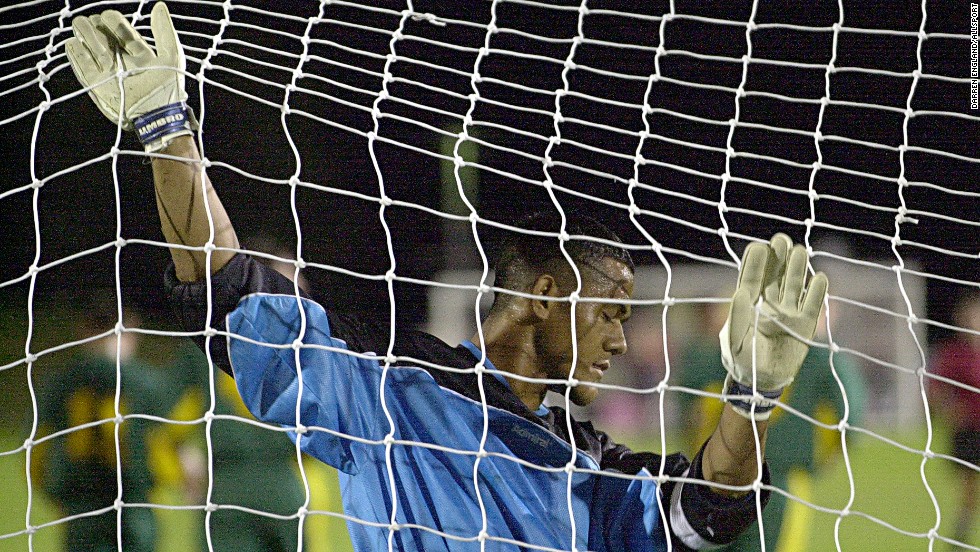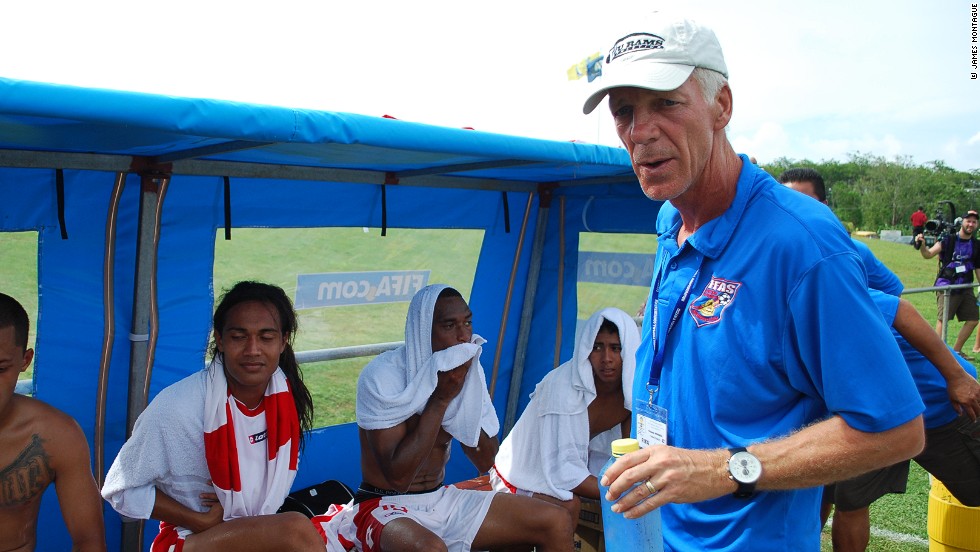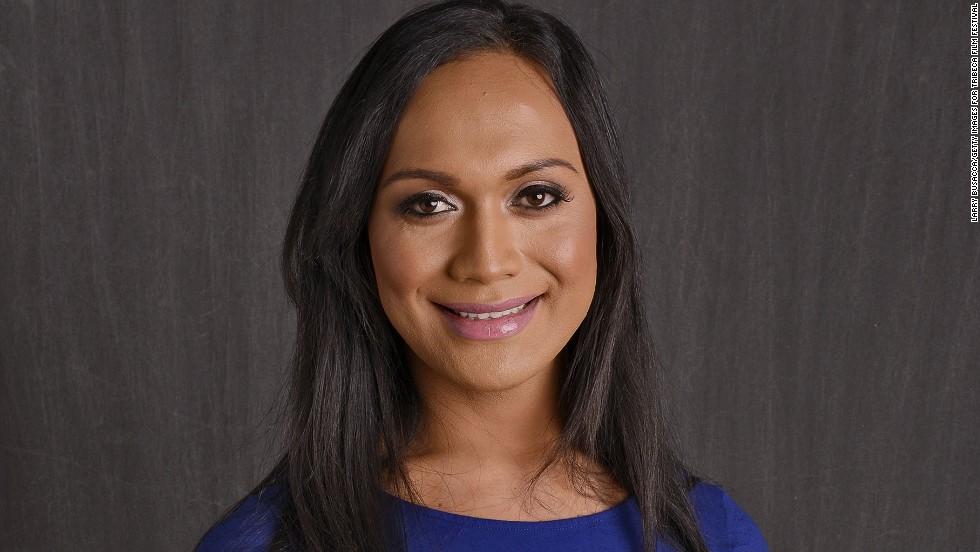CNN is serializing extracts from Thirty-One Nil, a new book from author James Montague, who traveled the globe documenting qualifying games for the World Cup.
In April 2001, a young American Samoan team with an average age of just 18 headed to Coffs Harbour in Australia for their first ever World Cup qualifier. The trip began badly. Almost the entire senior squad was ineligible as most of the players held Samoan passports, which, unlike American Samoa, was a sovereign nation with its own national team.
Only one senior player survived the cull and started that match: goalkeeper Nicky Salapu. Little did he know that he was about to take part in a game that would change his life forever. It took 10 minutes for Australia to break the deadlock. By then Salapu had made a string of fine saves to keep the scores level. Then came the avalanche.
When the full-time whistle went Australia had won 31-0, although the manually operated scoreboard mistakenly said 32-0. Archie Thompson scored 13 goals that evening. Both the score and Thompson’s haul were world records.

Nicky Salapu: A man with some “major demons going on.”
“I couldn’t see any reason why they would want to score so many goals,” Tunoa Lui, the coach of American Samoa, said after the match. To date the match has had nearly three million hits on YouTube.
The 31-0 debacle prompted the Oceania Football Confederation to reconsider how it should accommodate some of the most under-developed and under-populated footballing regions on the planet. While Australia successfully applied to join the tougher challenge of the Asian Football Confederation, the OFC devised a four-team, round-robin pre-qualification tournament featuring its four lowest ranked sides.
I had taken four flights to get to Samoa, on the other side of the world from England, traveling so far that I crossed the International Date Line. This year the pre-qualification tournament included American Samoa and Samoa (joint last, 204th on FIFA’s rankings), Tonga (second last, 202nd) and the favorites, the Cook Islands (196th).
The winner would qualify for the next group stage against regional powerhouses Tahiti, the Solomon Islands and New Zealand. I was expecting to see another massacre, a host of double-digit scorelines against possibly the worst national team the world has ever seen. But then, for the first time in their history, American Samoa hired a respected professional coach to stop the rot.
Thomas Rongen was an unusual fit for the job of American Samoa coach, a job that had previously been filled by amateur locals or journeymen. He had pedigree.

Thomas Rongen had previously coached the U.S. U20 team.
Born and raised in Amsterdam, Rongen was a promising defensive midfielder at Ajax but never made a first-team appearance for the Dutch club. Instead, in 1979, he moved to the brave new world of the North American Soccer League, where he played (and roomed) with his hero, Johan Cruyff, and Franz Beckenbauer. He married, stayed in the U.S. and went into coaching, winning an MLS Cup with D.C. United before being hired by the United States Soccer Federation to coach the Under 20s national team. It was the USSF that had effectively loaned Rongen to the American Samoans.
“Coaching education is poor,” he begins. “There’s no development ... no proper training ... they don’t play on standard proper size pitches ... Transportation between the islands is poor so people don’t turn up for matches sometimes ... there’s no science for strength and conditioning ... the soccer IQ level is very low, lower than I’ve ever encountered ... diet and nutrition is poor. You won’t believe the fast food places, people just shoving it down their throats. It’s known for obese people...”
He has only been with the team in the American Samoan capital of Pago Pago for three weeks, trying to knock his players into shape and impart what little technical know-how he can in such a small amount of time. Tomorrow his team will face their first test, the opening match of the pre-qualification tournament against Tonga, a team they had lost heavily to in the past.
The soccer IQ level is very low, lower than I’ve ever encountered.
In fact the biggest hurdle to overcome for Rongen wasn’t physical but mental. How do you begin to deal with a team that has been psychologically scarred by a 100% losing streak? “There are guys like the goalkeeper who played against Australia during that 31-0 game,” Rongen says.
Nicky Salapu is the only survivor from that team that was mauled in Australia a decade before, but Rongen has decided to call him up and start him in goal.
“This guy,” he says, shaking his head, “has got some major demons going on, totally driven by the thirty-one-nothing, erasing this for himself and for his family. He is so preoccupied about it, almost crazed. He gets confronted in Seattle. People say: ‘American Samoa? Oh, you’re the guy that gave up thirty-one goals.’ There’s some incredible scars. A lot of the guys who have lost every game. Not 2-1, or 3-2 but they’d get their asses kicked on a regular basis. So there was a defeatist attitude which I really had to change.”
As we talk, I see out of the corner of my eye a tall, beautiful woman walking past wearing a sarong, tying her long black hair theatrically into a ponytail. Rongen sees her, too. “On the island there is a great acceptance of people who are ‘hes’ but are actually ‘shes,’” he explains. “Essentially I’ve got a female starting at center-back. Just imagine the abuse in England, or Spain or in Russia, the racial slurs, the sexual slurs.”
Johnny Saelua wasn’t known to his team-mates by that name. She was known as Jaiyah Saelua and was about to become the first transgender player ever to start a World Cup match. “I want to travel the world and dance,” she says as she gracefully slides on to the bench opposite.

Jaiyah Saelua: The World Cup’s first transgender player.
Saelua speaks softly and exudes femininity. Outside football she studies performing arts at the University of Hawaii. “Anything,” she shrugs, when I ask which form of dance she prefers. “Modern, jazz, maybe a little bit of ballet ...”
Johnny ‘Jaiyah’ Saelua is a member of the fa’afafine, a biologically male third sex that identifies itself as female and is largely accepted in Samoan and Polynesian cultures. So accepting, in fact, that Saelua has played for the American Samoa team since she was 14.
“I read somewhere that it was a record when I was drafted into the national team,” she recalls. “I was reserve the whole tournament and I had to leave early because I was still in high school but the coach threw me on for 10 minutes.”
Yet in one of the remaining bastions of homophobia in public life, the locker room, Saelua has not encountered the kind of abuse that she would no doubt experience in the game pretty much anywhere else in the world.
We (the fa’afafine) can do what the boys do and what the girls do.
“I haven’t had any problems with the opposition teams,” she says, as if it would be absurd to suggest otherwise. “My teammates make me feel like a part of them. They don’t make me feel different because I am the way I am. It is what anybody needs to feel wanted within a team. That is why I always do my best. I can’t let them down.”
When Saelua is out of earshot, Rongen confides that she will start against Tonga alongside a goalkeeper who holds the record for conceding the most goals in an international match. He has no idea whether his intensive three weeks of work will make any difference. Whether his players can erase the scars of perpetual defeat. Whether they now have it within themselves finally to win a match or even just to score a goal. But the experience of living in American Samoa has already left its mark on Rongen.

“I’m an atheist, this country is very religious and spiritual,” he explains. Every day he sings and prays with his team. “It has made me think a little more about another being out there. I try and understand their songs and sing with them. I try to pray with them.”
It was more than a spiritual awakening. American Samoa had given Rongen something back. Even if his team went on to lose every game heavily, it was football as he remembered it as a child growing up in Holland, played for the love of the game with simplicity and passion.
“It is pure, it can’t get any purer,” he says. “I kick their asses up at 4.30 a.m., the guys go to work or school, back at 5.30 p.m. and I kick their asses again and they have a smile on their faces.”
The American Samoa team is now in the car park, gathering for dinner in the sparsely laid canteen nearby.
“Our spoilt million-dollar babies in England and Holland they would not accept this,” Rongen says. “There would be a riot.”
To be continued
Latest Stories
-
GPL 2024/2025: Prince Owusu screamer earns Medeama win over Young Apsotles
2 mins -
Burning old TVs to survive in Ghana: The toxic trade in e-waste
23 mins -
Perfume boss admitted he ignored Russia sanctions
36 mins -
Wicked proves popular as opening set to be biggest for Broadway film
42 mins -
Nominee for agriculture secretary completes Trump cabinet
54 mins -
ECG urges prepaid customers to top up to last one month ahead of system upgrade
1 hour -
Three more tourists named in Laos methanol deaths
2 hours -
Betway Africa offers a once-in-a-lifetime ‘Play-on-the-Pitch’ experience at Emirates Stadium
2 hours -
The rise and fall of Matt Gaetz in 8 wild days
2 hours -
School Feeding Programme: Bono East NIB seizes smuggled rice, arrest driver
2 hours -
Dr. Razak Opoku: Despite challenges, facts and data still prove NPP is better manager of the economy than NDC
2 hours -
Seidu Agongo: On December 7, it must be peace over power
2 hours -
2024 Election will take place on December 7; ignore misleading claims – EC
2 hours -
GPL 2024/25: Asante Kotoko bounce back with win over Aduana FC
3 hours -
GPL 2024/25: Gold Stars beat Vision FC to retain top spot
3 hours

